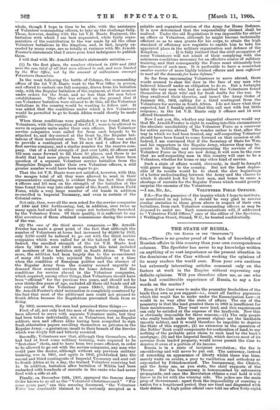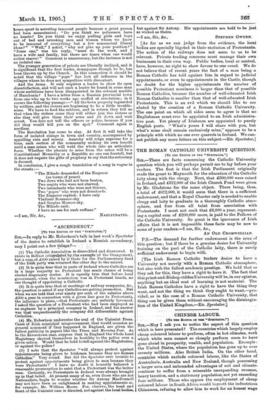SIR,—There is no greater proof of the lack of knowledge
of Russian affairs in this country than your own correspondence columns. The Spectator has never to my knowledge written on anything of so vast importance as the present situation in the dominions of the Czar without evoking the opinions of
its many readers the world over. Even your own cautious but extremely interesting articles comment only on the factors at work in the Empire without expressing any definite opinions. Will you therefore allow me, as one who has had considerable experience of Russia, to say a few words on the matter ?
Even if the Czar were to make the peasantry freeholders of the lands they own as you suggest—i.e., remit all further payments' which the mujik has to make under the Emancipation Law—it would in no way alter the state of affairs. The cry of the peasantry is that the land granted them in 1863 is insufficient for their maintenance. They want more land, and this requirement can only be satisfied at the expense of the landlords. Now this is obviously impossible for three reasons,—(1) The only people who really benefit under the present regime are the landlords (mostly nobles), and it would therefore be impolitic to deprive the State of this support ; (2) no extension in the operation of the Nobles' Bank could compensate for confiscation of land, to say' nothing of the probable prior claim to such land by the bank's mortgage; (3) and the Imperial family, which derives most of its revenue from landed property, would never permit the Czar to deprive it even of a portion of its income.
Russia is 'in a state of incipient revolution ; the fire is smouldering and will never be put out. The autocracy, instead
of conceding an appearance of liberty whilst there was time, merely waits on events, a prey to vacillation and orthodoxy as expounded by Pobiedonostzeff. The bureaucracy, the Church, and the Army are, as you state, the chief supports of the Throne. But the bureaucracy is honeycombed by, subversive( propaganda, and once the Revolution obtains a real hold it will throw in its lot with the winning side. The police are the main. prop of Government : apart from the impossibility of coercing a nation for a lengthened period, they are tired and disgusted with their duties. A high-police official once told me after forty-eight hours spent in arresting innocent people 'because a great person had been assassinated : " Do you• think we policemen have no hearts? Do you think we enjoy pulling girls and boys out of bed and arresting men and women whom we know to be innocent of everything but a few nonsensical liberal ideas ? " "Well," I asked, " why not give up your position ? " " Some one," was his reply, " must do the work, and I have a wife and family, but there are times when one would rather starve!" Comment is unnecessary, but the instance is not an isolated one.
The younger generation of priests are liberally inclined, and it is significant that the first leader, demagogue though he be, has been thrown up by the Church. In this connection it should be noted that the village "pope" has lost all influence in the villages where he does not sympathise with discontent.
And the Army. It only requires a leader to show its open dissatisfaction, and will not such a leader be found in some man whose ambitions have been disappointed in the colossal muddle of Manchuria? I have a letter from a Russian provincial town from one who up to two weeks ago scoffed at revolution ; in it occurs the following passage :—" All the town property isguarded by soldiers, and the rioters are beginning to be a little trouble- some. We have to feed the soldiers, and in return they tell us that when the rioters come they will either join the rioters or else they will give them their arms and sit down and wait arrest. You dare not tell the officers or 'police, because if you did they would kill you on the spot.' Comment again is needless.
The Revolution has come to stay. At first it will take the form of isolated risings in town and country, accompanied by appalling ruin and misery. Anarchy will reign supreme for a time, each section of the community seeking its own benefit until a man arises who will weld the whole into an articulate force. Whether the phoenix to arise from the ashes will be a Constitutional Monarchy or a Republic no one can foretell, but it does not require the gifts of prophecy to say that the autocracy is doomed. - In conclusion, I give a rough translation of a song in vogue in the streets :— "The Mikado demanded of the Emperor (as terms of peace)
Two Jews who had not been beaten, Two mujiks who were not starved, Two intendants who were not thieves, Two `popes' who were not drunkards. The Emperor replied: I have only Vladimir Romanov-sky
And Sergius Moscow-sky.
The Mikado said:
I have no use for such ruffians."
—I am, Sir, &c., NABLIIIDATEL.











































 Previous page
Previous page